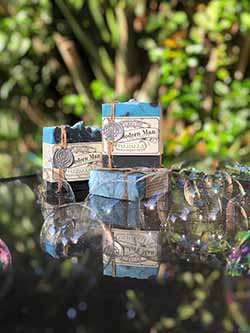Lathering Up with Lard: The Unsung Hero in Soap Making
 In the world of natural soap making, oils and fats play a pivotal role in determining the quality, texture, and skin benefits of the final product. While plant-based oils like olive, coconut, and palm oil have been popular choices, there's a traditional ingredient that's making a remarkable comeback – lard. This animal fat, once a staple in soap making, offers a range of benefits and presents a sustainable alternative to palm oil. In this post, we explore why lard is gaining popularity in soap making and the reasons to consider it over palm oil.
In the world of natural soap making, oils and fats play a pivotal role in determining the quality, texture, and skin benefits of the final product. While plant-based oils like olive, coconut, and palm oil have been popular choices, there's a traditional ingredient that's making a remarkable comeback – lard. This animal fat, once a staple in soap making, offers a range of benefits and presents a sustainable alternative to palm oil. In this post, we explore why lard is gaining popularity in soap making and the reasons to consider it over palm oil.
The Benefits of Lard in Soap Making
Rich in Skin-Loving Nutrients
Lard is high in vitamins and minerals beneficial for the skin. It's particularly rich in Vitamin D and has a similar lipid profile to human skin, which makes it incredibly moisturizing and nourishing.
Creates a Luxurious Lather
One of the standout qualities of lard-based soaps is their creamy, stable lather. Lard provides a luxurious feel that is often hard to achieve with solely plant-based oils.
Long-Lasting Bars
Soaps made with lard are known for their hardness and durability. Unlike some plant-based oils that can produce softer bars, lard ensures your soap retains its shape and consistency over time, leading to a longer-lasting product.
Gentle on the Skin
Lard-based soaps are incredibly gentle and suitable for sensitive skin. They provide effective cleansing without stripping the skin of its natural oils, making them ideal for those with dry or irritable skin conditions.
Lard vs. Palm Oil: A Sustainable Perspective
Environmental Concerns with Palm Oil
The widespread use of palm oil in various industries, including soap making, has raised significant environmental concerns. Palm oil production is a leading cause of deforestation, habitat destruction, and a threat to species such as orangutans and Sumatran tigers. This has prompted consumers and manufacturers to look for more sustainable alternatives.
Lard as a Sustainable Alternative
Lard presents a sustainable and environmentally friendly option for several reasons:
-
Byproduct Utilization: Lard is a byproduct of the meat industry. Using it in soap making helps reduce waste and promotes a more sustainable use of resources.
-
Lower Environmental Impact: The production and processing of lard have a considerably lower environmental impact compared to palm oil, especially concerning deforestation and biodiversity loss.
-
Support for Local Farming: Sourcing lard from local farms can support small-scale agriculture and reduce the carbon footprint associated with transportation.
Final Thoughts
The revival of lard in soap making is a nod to traditional practices, offering a high-quality, skin-friendly, and environmentally conscious choice. Its rich, moisturizing properties and sustainability credentials make it a compelling alternative to palm oil. As we become more conscious of our environmental impact and seek to make responsible choices, lard stands out as a viable and beneficial option in the world of natural soap making.
In embracing lard, soap makers and users alike can enjoy a product that not only cares for the skin but also respects the planet. The return to traditional ingredients like lard is a testament to the timeless wisdom in many old-fashioned practices and a step towards a more sustainable future in the realm of personal care.
More Articles
